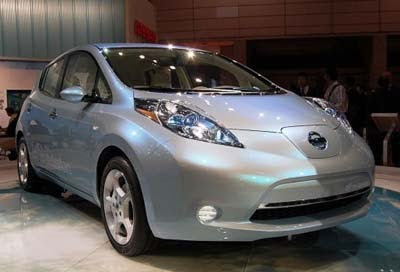$25 280 for the Nissan Leaf
Last Updated:
 That’s actually after the $7500 federal tax credit.
That’s actually after the $7500 federal tax credit.
Including the $7,500 federal tax credit for which the Nissan LEAF will be fully eligible, the consumer’s after-tax net value of the vehicle will be $25,280. The Manufacturer’s Suggested Retail Price *(MSRP) for the 2011 all-electric, zero-emission Nissan LEAF is $32,780, which includes three years of roadside assistance. Additionally, there is an array of state and local incentives that may further defray the costs and increase the benefits of owning and charging a Nissan LEAF – such as a $5,000 statewide tax rebate in California; a $5,000 tax credit in Georgia; a $1,500 tax credit in Oregon; and carpool-lane access in some states, including California.
As a result of aggressive pricing and the availability of the $7,500 federal tax credit whose benefit is immediately included, Nissan will be able to offer a monthly lease payment beginning at $349, not including state or local incentives, which could further reduce the net cost of the Nissan LEAF.
“Imagine the possibility of never needing to go to a gas station again. Or of paying less than $3 for 100 miles behind the wheel. Or of creating zero emissions while driving,” said Brian Carolin, senior vice president, Sales and Marketing, NNA. “Nissan leads the industry by offering the first affordable, zero-emission vehicle for the mass market. Nissan LEAF truly is in a class by itself.”
The vehicle at the SV trim level is well-equipped with a variety of standard features, including an advanced navigation system and Internet/smart phone connectivity to the vehicle, enabling pre-heat/pre-cool and charging control. Nissan LEAF is equipped with energy-efficient LED headlights and makes extensive use of recycled and recyclable materials, such as seat fabric, instrument panel materials, and front- and rear-bumper fascias. Other standard amenities include Bluetooth connectivity; Intelligent-key with push button start; Sirius/XM satellite radio capabilities and roadside assistance. Safety features include vehicle dynamic control (stability control), traction control and six airbags. The SL trim level, available for an additional $940 (MSRP), adds features including rearview monitor, solar panel spoiler, fog lights, and automatic headlights.

The First major leap forward since the invention of the internal combustion engine. No Gas, No Oil, No Oil Filter, No Gas Filter, No Valves, No Noise, No Emissions. Yes Nissan, You and all the World wins!
Guess I'll be the first to go ahead and crown Nissan as the "most pivotal innovative forward thinking car company, period.
How does Nissan come up with taking $7,500 off the sticker price through a "Federal Tax Credit?" The $7,500 ISN'T a cash deduction off the price of the vehicle. It's $7,500 less income you need to report when you file your taxes. (Same as a first time buyer's credit when you get a new mortgage for a house). Puts you in a lower tax bracket.
Will someone please explain?
So unless you own a "real" car, you'll never be able to travel beyond a maximum range of fifty miles? And if you have the headlamps and radio on, maybe thirty five miles or less. What is this, the f-ing middle ages? I'll take the Volt.
A tax credit is NOT the same thing as a tax deduction.
The tax savings you get when buying a house is a deduction. Not a credit.
A tax credit is good for the full amount.
Vince: I understand the distinction of "tax credit" vs. "tax deduction" (tax credit is dollar-for-dollar savings on what you owe the IRS).
But my question remains – How does Nissan say the vehicle becomes $25,280 … when the "savings" isn't realized until you file your taxes? You are still financing the full amount of the vehicle at signing (plus accrued interest). Please clarify. Thanks.
Settle down about the taxes folks. This world leading car would sell without the tax savings. Nissan wins and so does the world. What a company. The new car for the movie stars.
Love the Dino, you are spot on my friend, I will second the motion.